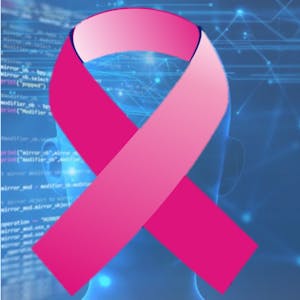Artificial Intelligence for Breast Cancer Detection
About this Course
The objective of this course is to provide students the knowledge of artificial intelligence processing approaches to breast cancer detection. Students will take quizzes and participate in discussion sessions to reinforce critical concepts conveyed in the modules. Reading assignments, including journal papers to understand the topics in the modules, will be provided. The course is designed for students who are interested in the career of product development using artificial intelligence and would like to know how AI can be applied to mammography. The course content is focused on the AI processing paradigm along with the domain knowledge of breast imaging. This course approach is unique, providing students a broad perspective of AI, rather than homing in on a particular implementation method. Students who complete this course will not only leverage the knowledge into an entry level job in the field of artificial intelligence but also perform well on projects because their thorough understanding of the AI processing paradigm.Created by: Johns Hopkins University

Related Online Courses
Topics covered by this Specialization include basic object-oriented programming, the analysis of asymptotic algorithmic run times, and the implementation of basic data structures including arrays,... more
In this course, you\'ll explore the basic structure of a web application, and how a web browser interacts with a web server. You\'ll be introduced to the Hypertext Transfer Protocol (HTTP)... more
This course, developed at the Darden School of Business at the University of Virginia and taught by top-ranked faculty, will teach you the fundamentals of managerial accounting including how to... more
Leaders must have the ability to develop and deploy effective strategies. This specialisation will prepare you to be the strategic change-maker capable of enabling your organisation to compete into... more
Across the world more than 420 million people are living with diabetes. Two thirds of these have not yet been diagnosed. When discovered late or managed incorrectly, diabetes can damage your heart,... more








